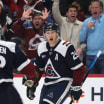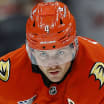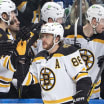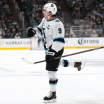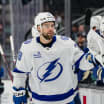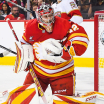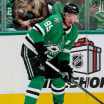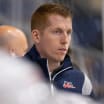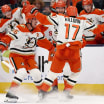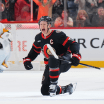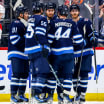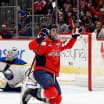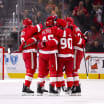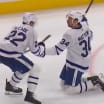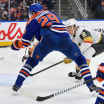NHL.com's Q&A feature called "Five Questions With …" runs every Tuesday. We talk to key figures in the game and ask them questions to gain insight into their lives, careers and the latest news.
The latest edition features Florida Panthers defenseman Aaron Ekblad:
Five Questions with Aaron Ekblad
Panthers defenseman discusses slow start, leadership role
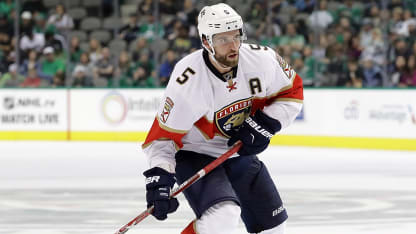
© Ronald Martinez/Getty Images
NEW YORK -- Five points, all goals, is not a number Florida Panthers defenseman Aaron Ekblad expected to see next to his name after 19 games, not after putting up 36 points in 78 games last season and 39 in 81 games as a rookie two seasons ago, when he won the Calder Trophy.
"Slow start," Ekblad said matter-of-factly before he scored in a 3-2 shootout win against the New York Rangers at Madison Square Garden on Sunday. "There's no doubt about it."
But not demoralizing, not by any means, even though Ekblad, 20, hasn't looked like the defenseman we have seen in the previous two years.
His shots on goal are up (2.57 this season after 2.33 last season), but he's also on the ice for more shot attempts and chances against than usual. The Panthers have had the puck more when he's on the bench based on the shot-attempts metric.
But Ekblad, who was named an alternate captain on Oct. 9, has three goals in the past four games. The Panthers have won four of their past five games. They are 10-8-1, and were 8-8-3 through 19 games last season, when they won the Atlantic Division with 103 points.
"I feel things are trending up and the puck will start finding the net the more I shoot," Ekblad said. "That's it. Play good, solid, responsible defense and things will come."
Ekblad might as well be talking for the entire Panthers' team when he says that.
The Panthers might not be off to the start they wanted, but they're getting better and they expect to get center Nick Bjugstad (hand) in the lineup for the first time this season when they play the Philadelphia Flyers on Tuesday (7:30 p.m. ET; FS-F, CSN-PH, TVA Sports, NHL.TV).
They're still missing Jonathan Huberdeau (Achilles) and Alexander Petrovic (lower body). They also revamped their defense in the offseason, signing free agents Keith Yandle and Jason Demers, trading Dmitry Kulikov to the Buffalo Sabres for Mark Pysyk and trading Erik Gudbranson to the Vancouver Canucks. They also lost Brian Campbell to free agency.
"We're a .500 team right now that knows we have better in us," Ekblad said.
Ekblad talked more about his game in his third NHL season, about the process of becoming a young leader on the team and more in a Q&A with NHL.com.
Here are Five Questions with … Aaron Ekblad:
No Willie Mitchell. No Brian Campbell. They were your guys for the first two seasons. So no safety net for you, so to speak. How has it been for you not having those two around since they were instrumental in helping you develop?
"Out of the nest, you could say. But we gained two guys with not the exact same knowledge, not the exact same games played, but quite a few in Jason Demers and Keith Yandle. Those are guys that I look to everyday to still learn from in the same kind of sense that I learned from Willie Mitchell and Brian Campbell, on both sides of the puck, offensively and defensively. Each of them has different perspectives and I respect them just as much as I do the other guys."
You are also in a different spot wearing the 'A' on your sweater and you have guys like Mike Matheson, who is two years older than you, looking at you for guidance now. Is it different? Is it challenging to be in that role as opposed to the other role you were in?
"Absolutely. Yeah. There are different challenges to everything, but as much as he is looking to me, I'm looking to him. As much as anyone might be looking to me, I'm looking to them as well because in the end it's still my third year in the League. Some people may forget that sometimes, but I'm not perfect and I'm always going to make mistakes. I want to continue to make mistakes because you learn and become better as a player. You're never going to be perfect and that's kind of the challenge of it. Added responsibility, there's no doubt about it, but I feel good and I feel confident that things will get better. You always have to stay positive and not let negative feelings overcome it."
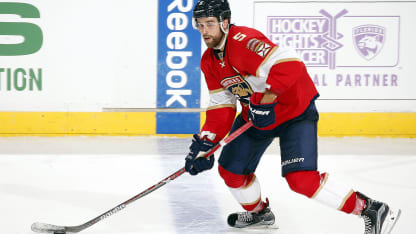
© Eliot J. Schechter/Getty Images
You said you don't want to let negative feelings creep in. Is that an issue for you this season? Is that a challenge you're trying to overcome now?
"Always. There's always negative feelings, but to stay positive is really important. That's not a big part of my day, worrying about little things that happen here and there. It's there and in the back of your mind, but I'm a positive, confident person creeping on the edge of cocky. I feel that's where I need to be."
What are you learning about trying to come together after so much changeover in the defense corps this past offseason?
"Of course it takes time. It's chemistry, right? We played two full years with those other guys. Now that they're gone, we're learning and we're going to play six years with the new guys, maybe more. It's been just over one month. To let things fall too heavily on all of our shoulders, it's not worth it. It's more focusing on positive things that happen every day, lifting each other up rather than worrying about, with all due respect, what you would say or anybody else?
"I feel we've definitely been turning a corner since we got Juice back, Jussi Jokinen. As Nick Bjugstad comes back, and once [Petrovic] gets better and [Huberdeau], we're going to be a great team. We know we're already a great team. We have the structure. We have the personnel to do it on the power play, on the penalty kill, at 5-on-5. We know we can. That's the kind of confidence and swagger that we have."
When you came into the League a few years ago did you feel prepared to be a professional athlete because it looked from our perspective that you had it all figured out? Did you feel as confident as you looked?
"It's not that I had it all figured out, but expectations and responsibilities were all lowered. Coming in as a young defenseman you don't have the kind of expectations and responsibilities that you would have in your third, fourth, fifth, 10th or 15th year. So, some could say it's a little bit easier, but that's not the case. It's still very difficult. Like I do to this day, I take it day by day and not let it fall too heavily on my shoulders because in the end it's a team sport. We're all here to lift each other up. You're not going to win the Stanley Cup in September or October. It's a big process. Obviously it's not easy to see from the outside looking in, but we're a confident team and I'm a confident player."
